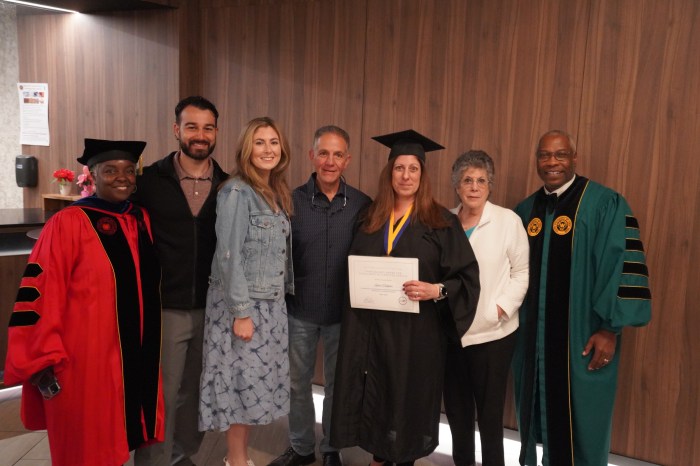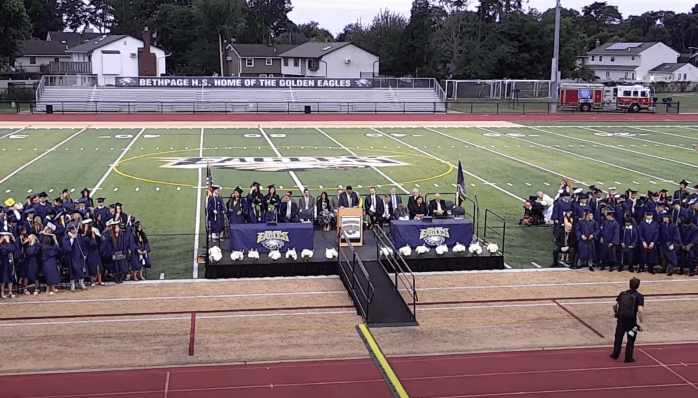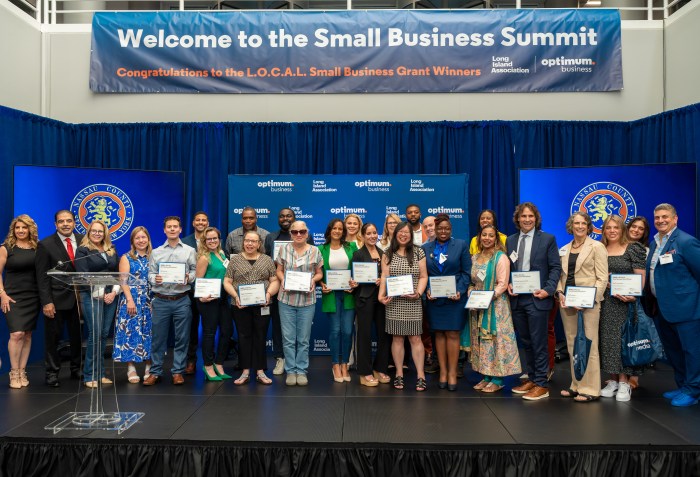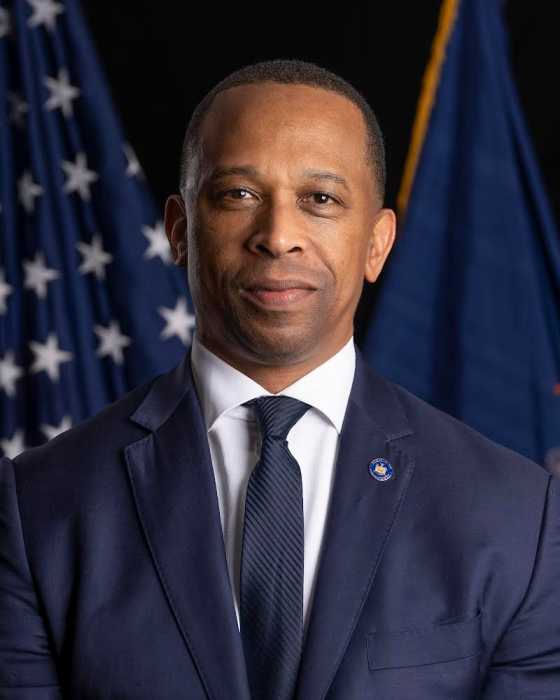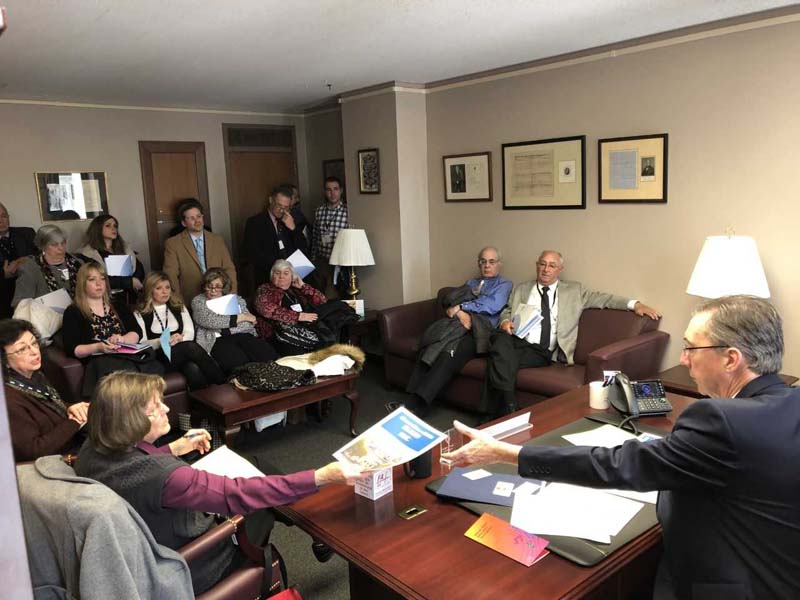
(Photos courtesy of Senator Jim Gaughran’s Office)
Since taking over the seat that was once filled by long-time Senator Carl Marcellino, Senator Jim Gaughran has been completely engulfed in the world of Albany politics, passing bills and debating issues that concern New York, and specifically the fifth senate district.
After his first legislative session, he sat down with the Plainview-Old Bethpage Herald to discuss what it’s been like to serve in the New York State Senate and what he looks to accomplish moving forward.
Q: What has it been like to settle into this position thus far?
A: Well, it’s been a roller coaster. I feel like we’ve accomplished a lot in six short months. The big difference between being elected as a state senator and serving as a fresh senator is the historic opportunity that’s here. Normally, if you get elected as a state senator or to the state assembly, you pretty much don’t have much influence because of the nature of it and there’s little turnover in the state legislature. The Democratic majority has 39 people and 15 are brand new, such as myself, was able to have an ability to get things done more than you normally would, including the fact that I chair the local government committee. It oversees the laws of towns, villages and county governments.
There are a lot of things that we’re proud of. One is starting electoral reforms. New York is lagging behind in voter participation, one of the lowest in the country, primarily because it’s so difficult for people to vote, starting with only having one day. Most of the larger states have early voting. As of this year, starting in October, people will be able to vote 10 days before the election. It’s a big difference. Some of the criticism during the legislative session was the extra voting is geared for Democrats, but it’s not at all. In my district, it’ll help everyone, like bankers, stock brokers, construction workers, teachers, firemen and police officers. It’s for people who have the type of job who can’t vote that day. Getting absentee ballots in New York is also very difficult because you need to have a specific reason. The 10-day early voting means there’s absolutely no excuse for someone not to vote. We think that’s helpful for everyone.
We passed some laws dealing with gun safety. One that I co-sponsored if the red flag law, which sets up a system that if somebody if viewed as having the mental capacity to use a gun because there’s a fear they can use the gun to harm themselves or others, the gun can be taken away from them. This is a law that evolved from people who were parents of children who were killed in Newton and Parkland. If that law would have been in effect, their loved ones would be alive. What it does is, during those two tragedies and after it happened, everyone asked why did it happen? Lots of different people saw the shooters and said, ‘Something was wrong. We were worried that he might do something like this.’ But they also said, ‘We didn’t know what to do, where to go or what the process was.’ Now, there’s a process. A police officer, teacher or family member can initiate a process that would get them rather quickly to a judge and bring the individual before them, give the individual an opportunity to explain themselves, so they can see if the gun should be taken away, even if it’s temporary. It’s modeled after an order of protection. That is something I think will be very helpful.
Q: What do you feel you’ve done well with?
A: One of the bills that I wrote that will hopefully be signed by the governor is to allow public water districts or water authorities to sue polluters—manufacturers of chemicals and other contaminants—where they have basically polluted our drinking water supply. The change that I make, which includes a three-year statute of limitations, gives these public water entities the ability to sue, not be thrown out in court and recoup hundreds of millions of dollars. What’s important about that is Long Island is struggling with our drinking water supply. We constantly have contamination that has to be dealt with. In some cases, we need to build new wells. The State of New York is putting in billions of dollars over the next few years to assist Long Island water companies in dealing with this. That’s our tax dollars and the local tax payers are spending even more. We can sue the polluters to recoup more money because it was they who caused the problem.
The other law I wrote that I’m proud of is there were a bunch of people involved right after 9-11 and the months and years after, who worked alongside firefighters, police officers and other emergency responders and now have debilitating medical issues, like cancer. They aren’t entitled to the same disability benefits that the first responders have, simply because of the way the bill was written. One constituent of mine worked for the Department of Environmental Conservation right under the Brooklyn Bridge. He got a call from his boss to turn back, but he was there throughout the weeks after and has serious medical issues. Potentially, 600 people can qualify, but they need to prove they have medical conditions directly related to 9-11.
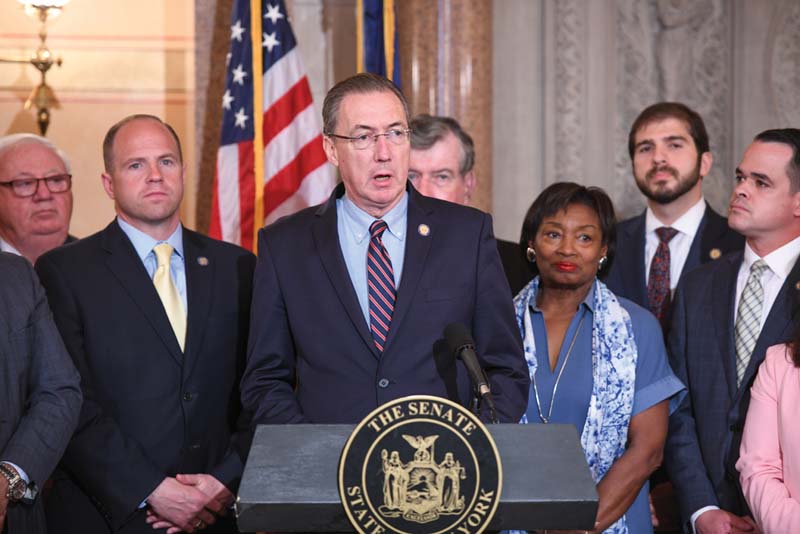
Q: What are your goals for the next session?
A: As chairman of the local government committee, I will hold hearings throughout the summer and fall—not just on Long Island, but throughout the state—to see if we can come up with laws to help local governments reduce costs. We want to see where the state mandates things too much without providing the funding. Maybe we can avoid some of that. I will be doing more limousine safety that we passed in the Senate but didn’t passed in the Assembly, and I’m very disappointed in that. We need to push to have that done because constituents of mine and people across the state who had family members die because of limo crashes that were caused by drivers who shouldn’t have been on the road. One of the laws should make penalties higher if they make an illegal U-turn, if they excessively speed or go through red lights. They would be heavily fined, lose their license or even go to jail.
Also, we introduced legislation to give the American constituents to have American water as their private water. It gives the option of creating a public water authority. It would be a long process, but perhaps they can convert to public water and attract adjacent water districts.
I have legislation that I filed this year but didn’t go anywhere. I want it to be voted on next year, which is to give more protections to firefighters, police officers, veterans and those who are active in the military. If a crime is committed against them and that crime was done simply because of who they are and their role, the penalty should be increased. It’s similar to hate crime legislation. There are individuals who target them. I want to get them more protection, including our military folks. It used to happen a lot more, but there are still people who don’t have the same view of our veterans and active service members. If they’re being discriminated against because of that, the penalties need to be severe.
Q: What’s the local reaction to some of the more controversial bills that have passed, such as giving driver’s licenses to illegal immigrants?
A: I voted against that. While I recognize there is a need to help the immigrant community, we need Congress and the president to come up with a real immigration reform because we need to recognize there are millions people in this country who came here when they were very young and they need to be integrated into our society. Congress needs to deal with that. The problem with the driver’s license law and the way it was written is it did not include the public protections that the other 11 states and the District of Columbia that are needed to make sure the person is not someone who has broken a law. Also, it needs to make sure we’re not giving driver’s licenses to people who have dangerous driving records. Half of the states require finger printing, which this doesn’t. Five of them require much more detailed information.
The main thing I’ve learned up there is you need to really read the bills because there’s a lot of narratives. There are narratives, and then there is law. The narrative of the bill is a lot different than the actual law that is passed. We need to get it right. We need to talk to law enforcement officials about how laws like this will be implemented. I felt that the way the law was written, I just couldn’t vote for it. I’m not sure how many people will even apply for it because it may be used by the Immigration and Naturalization Service (INS) to deport people. The State of New York cannot fix immigration. It needs to be done by Washington.
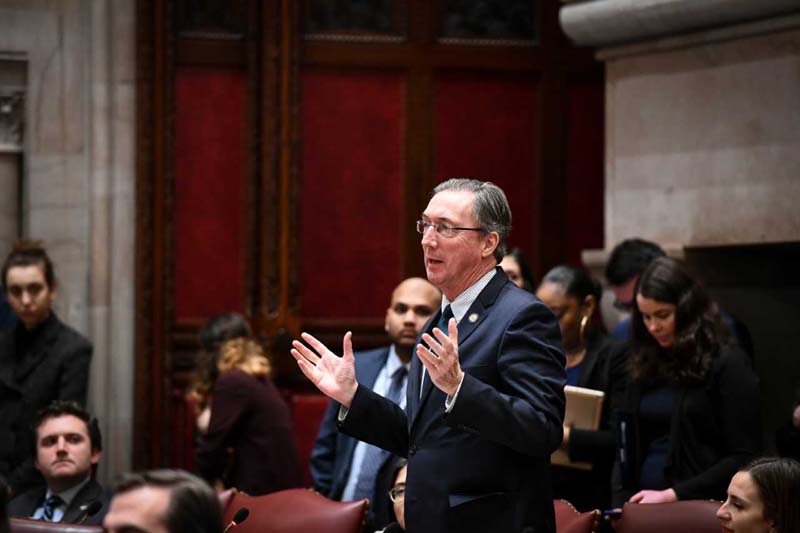
Q: What’s your message for constituents going forward?
A: We need to do more to give the tools to local governments to reduce property taxes. One of the biggest things is the first bill I passed in the Senate is making the 2 percent property tax cap permanent. I was the sponsor of that law and it’s now the law of the land, and it’ll probably save us for decades. It puts pressure on school districts and local governments to manage their budgets. The state government has to provide more funding for school districts. We got a record amount of school aid this year. Property tax is getting more out of control. My goal for next year is to get additional funding for our local school districts. Glen Cove, in particular, got about a 10 percent increase this year. But I’m looking to continue that for next year. I need to make sure that the State of New York knows that Long Island, with our higher cost of living and large immigrant populations moving in, we are getting our fair share. We have some of the greatest schools. We have some schools that are struggling, and I’d like to have all school districts are of high caliber. To me, education is the most important thing in terms of funding in the state budget.




